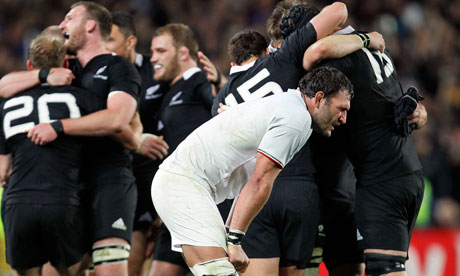
They say that France lost the final of the 2011 Rugby World Cup, but we don't have to believe it if we don't want to. With everything stacked against them, they produced the performance that gave the tournament a most memorable climax.
All New Zealand did was win, which was presumably all they wanted to do in order to end their famous 24-year drought. They had hosted the tournament beautifully but when it came to the showdown they derived disproportionate benefit from home advantage, including a few free gifts from a referee who spent the first half infuriating even neutrals by giving virtually every decision to the men in black.
France's fans were unable to make themselves heard in a stadium draped in black but their team's display was full of spirit, generosity, creativity and adventure. Perhaps this was not the best France squad of all time, or anything like it, but they did full honour to the memory and traditions of their forebears and were hugely unfortunate not to become the first side from their nation to capture the Webb Ellis Cup.
The All Blacks were grim, pragmatic and joyless: a caricature of a stereotype. Nothing they did in the 80 minutes truly illuminated the game. Their try was a gimme, tinged with a hint of obstruction, and they never came close to scoring another. Their defence was impressive enough as France grew in self-belief during the second period but it would have been welcome, given the circumstances, had they felt able to take on France at a game of rugby involving more than the arts of attrition.
They could point out that they lost Dan Carter, their principal source of invention, before the tournament had got properly under way. But this is a nation of 4.3 million people obsessed by the game, and the absence of one player should not have caused them to go quite so resolutely into their shells on the big night. They appeared to be paralysed by fear of the consequences of another 1999 or 2007.
One or two first-half flashes apart, there was virtually nothing of the piercing movement that tore Australia apart in the opening phase of the semi-final. Perhaps Australia were not as good as we might reasonably expect the current Tri-Nations champions to be; perhaps, too, France were not nearly as bad as their earlier performances in the tournament had led us to believe.
Some Welshmen will no doubt suggest that last night's defeat by a single point represented a form of justice after France had reached the final via a similarly narrow victory a week earlier over a side controversially reduced to 14 men. But there can have been few among them who were not so seduced by this display into ending the evening nursing a sense of disappointment that, with 30 minutes to go after cutting the margin to that single, lonely point, the white shirts had failed to find the decisive touch.
If New Zealand won the right to call themselves world champions for the next four years, France resurrected a reputation grievously – but not, as it turned out, irreparably – damaged by the events of recent weeks. With four minutes left, Marc Lièvremont gave us one last bizarre decision by which to remember him: the replacement of Dimitri Yachvili, a normally dead-eyed kicker, by a player with zero caps at a time when a drop goal would have won the World Cup and changed rugby history. Yachvili was tiring, but still looked exasperated as he left the pitch.
On balance, however, Lièvremont's players assembled a performance that ensured they will be able to hold their heads up on their return home. This was not to be compared with the limp effort of Jacques Fouroux's side – including Serge Blanco, Philippe Sella, Pierre Berbizier, Daniel Dubroca and Pascal Ondarts – while losing 29-9 against the same opposition in the 1987 final. There was nothing anticlimactic about this return to Eden Park. At the end of a campaign in which he was endlessly ridiculed and vilified, Lièvremont could say that he had taken his squad closer to the title than any of his his predecessors.
"I'm tremendously sad but tremendously proud, too," he said during a dignified post-match press conference. He made no reference to the collision between Richie McCaw's knee and the temple of Morgan Parra in the 11th minute, which forced the early removal of France's own influential fly-half.
In many ways, even in defeat, this was the French at their best, slowly swelling in confidence through the first half and practically bursting with defiance in the later stages as they refused to accept the general assumption of their opponents' superiority.
The way they responded to the haka, with a novel formula devised in their hotel yesterday morning, provided the night's first drama. Forming up in an arrowhead inside their own half, with their captain at the tip, they waited until Piri Weepu was halfway through leading the All Blacks' performance before beginning a slow advance towards the halfway line and eventually, in contravention of the established protocol, a few yards across it.
In everything they subsequently did they were bold, they were brave, and they were nobody's idea of losers, even when the winners were queueing up to receive their medals. They were France, recalled to life, and you had to love them for it.

